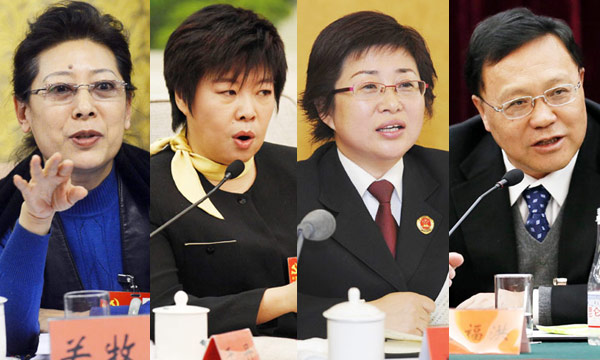What to watch in China's political reform?
(Xinhua)
Updated: 2012-11-11 14:01
Rule of law
"Where is justice?
"Both Chinese and foreign literary works have a wealth of Robin Hood-style figures. But a chivalry is not the answer, as he can help just a few people. In reality, one can only find justice in the rule of law," Tong Lihua, a Beijing-based lawyer, wrote the lines in the preface of his book that summarized his 12-year experience managing a non-governmental legal aids center for child abuse victims and migrant workers who are denied wages and benefits.
"I believe the rule of law is the most effective solution to problems in the Chinese society today," said Tong, also a delegate to the 18th CPC National Congress.
Tong said while there are people who doubt the rule of law might work well in China, he never has that doubt.
"The best example in China's rule of law process is the way how we deal with drink driving," Tong said. "When people see no matter who is caught drink driving, he will be severely punished, most people won't drink if they drive."
Alcohol is indispensable in most dinner gatherings. While driving could not be used as an excuse for not drinking in the past, few drivers are forced to drink after tougher laws against reckless driving were strictly enforced in May 2011. Official figures show a sharp decline of drink driving cases.
The CPC formally introduced the language "rule of law" in its five-year report at the Party's 15th National Congress in 1997. Since then, much progress in legislation, law enforcement have been made, but calls for greater reform, especially judiciary reform, grew louder in recent years.
A Xinhua survey before the Congress showed that social justice is high on the "wish list" of ordinary Chinese.
Yan, the Party School professor, pointed out that the rule of law is among the three aspects singled out in Hu's report on political reform as areas that deserve more efforts.
"The CPC should give greater scope to the important role the rule of law plays in the country's governance and in social management," says the report, which also pledges further judiciary reform to ensure fair and independent exercise of judiciary and procuratory rights by the court and the prosecutors.
"If you look at details, Indian democracy, Indonesian democracy, American democracy - they are all different in profound ways. But the basics that define democracy - election, the rule of law, supervision - are the same," Cheng Li, a senior fellow at the Washington-based Brookings Institute said.
In an interview with Xinhua before the Congress, Li, a Chinese politics expert, said he believed "bold steps" of reform were being considered by the leadership because of the necessity to do so to cope with the fast changing society, especially in the wake of the Bo Xilai incident.
"No organization or individual has the privilege of overstepping the Constitution and laws, and no one in a position of power is allowed in any way to take one's own words as the law, place one's own authority above the law or abuse the law," Hu warned in his report.
Related Stories
Election methods of CPC National Congress approved 2012-11-10 19:44
CPC National Congress gets world attention 2012-11-08 16:12
Key national congresses in CPC history 2012-11-07 11:13
How CPC National Congress delegates elected 2012-11-06 21:30
Makeup of delegates to 18th CPC National Congress 2012-11-06 20:49
CPC determined in political reform: official 2012-11-09 21:04
Communists walk fine line in reform 2012-11-09 19:57

Top News
Xi emphasizes adherence to CPC Congress spirit
Top legislator urges implementation of congress spirit
Moderately prosperous China brings chances to world
Video







